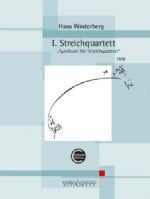Winterberg, Hans - 1. Streichquartett
1936 was Hans Winterberg's most fruitful creative year before the catastrophe that befell Czechoslovakia with the annexation of the Sudeten territories in 1938 and the „rest of Czechoslovakia“ in 1939 by Nazi Germany. Winterberg lived as a freelance composer in Prague, had found his own style after studying with Alexander von Zemlinsky, among others, and ventured into the great forms of the tradition for the first time: piano sonata, symphony and string quartet. Winterberg's First String Quartet, whose manuscript survived the turmoil of the war and was not premiered until 2024, „a masterpiece not only of Czech music but of the entire string quartet repertoire of the 20th century“ (Michael Haas), is perhaps his most complex, most demanding work from the pre-war period. In terms of the interpretational challenges and the peculiarities of its stylistic approach, it lies at the interface between the quartets of Janácek and his pupil Pavel Haas and the quartet compositions of the protagonists of the Second Viennese School.

